
Paul Julien André Mauriat was a French orchestra leader, conductor of Le Grand Orchestre de Paul Mauriat, who specialized in the easy listening genre. He is best known in the United States for his million-selling remake of André Popp's "Love is Blue", which was number 1 for 5 weeks in 1968. Other recordings for which he is known include "El Bimbo", "Toccata", "Love in Every Room/Même si tu revenais", and "Penelope". He co-wrote the song Chariot with Franck Pourcel. Pourcel and Mauriat.

"Stand by Your Man" is a song recorded by American country music artist Tammy Wynette, co-written by Wynette and Billy Sherrill. It was released on September 20, 1968, as the first single and title track from the album Stand by Your Man. It proved to be the most successful record of Wynette's career, and is one of the most familiar songs in country music. The song was placed at number one on CMT's list of the Top 100 Country Music Songs.
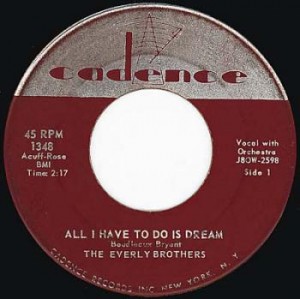
"All I Have to Do Is Dream" is a song made famous by the Everly Brothers, written by Boudleaux Bryant of the husband-and-wife songwriting team Felice and Boudleaux Bryant, and published in 1958. The song is ranked No. 141 on the Rolling Stone magazine's list of The 500 Greatest Songs of All Time. The song is in AABA form.
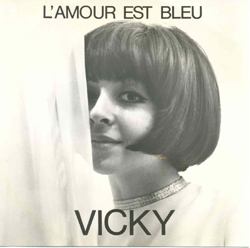
"L'amour est bleu" is a song whose music was composed by André Popp, and whose lyrics were written by Pierre Cour, in 1967. Bryan Blackburn later wrote English-language lyrics for it. First performed in French by Greek singer Vicky Leandros as the Luxembourgish entry in the Eurovision Song Contest 1967, it has since been recorded by many other musicians, most notably French orchestra leader Paul Mauriat, whose familiar instrumental version became the first number-one hit by a French lead artist to top the Billboard Hot 100 in America.
"Make It Easy on Yourself" is a popular song written by Burt Bacharach and Hal David which was first a hit for Jerry Butler in 1962. The best known version is the 1965 recording by the Walker Brothers for whom it was a No. 1 UK and Canadian hit. Dionne Warwick, who made a demo of this song in early 1962, later had a hit with the song in 1970.
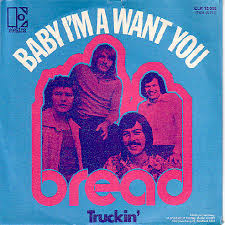
"Baby I'm-a Want You" is a song by American soft rock band Bread. The single was released in October 1971 and became the title track for the album of the same name, released in January 1972.
"The World We Knew (Over and Over)" is a popular song recorded by Frank Sinatra in 1967. It is based on a composition by Bert Kaempfert, a German musician and composer.
"Moon Over Naples" is a 1965 instrumental composed and recorded by German bandleader Bert Kaempfert. The instrumental version reached No. 6 on Billboard's Adult Contemporary chart. It won a BMI Award in 1968.

Fancy is the sixth studio album by American singer-songwriter Bobbie Gentry. It was released on April 6, 1970, by Capitol Records. The album was produced by Rick Hall and recorded at his FAME Recording Studios, apart from Wedding Bell Blues and Raindrops Keep Falling On My Head which were produced by Gentry herself, and recorded at Capitol Studios in Hollywood, California. The cover art for the album is an uncredited painting of Gentry, based upon a reference photograph. According to the liner notes for the 2004 compilation Chickasaw County Child: The Artistry of Bobbie Gentry, the painting is believed to have been done by Gentry herself.

"Something Better to Do" is a song written by John Farrar and recorded by Olivia Newton-John. The song was released in September 1975 as the lead single from Newton-John's sixth studio album, Clearly Love. The narrator of the song muses that she's having a hard time adjusting to life without her departed lover; even the birds are wasting their songs singing to her, and until her beloved returns, "the birds will have to find something better to do."

The Andy Williams Show is the twenty-sixth studio album by American pop singer Andy Williams that was released in the fall of 1970 by Columbia Records. In his review on AllMusic.com, William Ruhlmann writes that "The Andy Williams Show LP was not a soundtrack recording from the TV series, and it was not really a live album, although it gets categorized as such. What appears to be the case is that Columbia Records took a group of Williams' studio recordings, most of them made during the summer of 1970 and consisting of his versions of recent soft rock hits, and added a lot of canned applause along with some of the kind of musical interludes used to usher numbers on and off on the show, including bits of its "Moon River" theme music at the start and the finish."

Love Story is the twenty-seventh studio album by American pop singer Andy Williams that was released on February 3, 1971, by Columbia Records. This was another in his series of cover albums, but the title track, subtitled "Where Do I Begin", was the one song included that he originated.

You've Got a Friend is the twenty-eighth studio album by American pop singer Andy Williams, released in August 1971 by Columbia Records. The album bears a striking resemblance to the Johnny Mathis album You've Got a Friend released that same month. Besides sharing their name, the two albums are both made up of covers of easy listening hits of the time, with 11 songs each, and the two albums have seven songs in common that are positioned in a similar order.
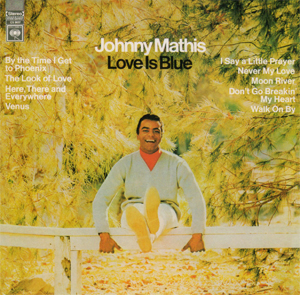
Love Is Blue is an album by American pop singer Johnny Mathis that was released on March 6, 1968, by Columbia Records and adhered even more strictly to the concept of the "cover" album of recent hits than its predecessor in that five of the 10 songs selected for the project were chart hits for the original artists within the previous year and another three had charted within the previous decade. Even the two remaining selections that did not bring chart success to the original artists were by the hit songwriting teams of Burt Bacharach and Hal David and John Lennon and Paul McCartney and left no room for the usual inclusion of some original songs or material from Broadway.

Close To You is an album by American pop singer Johnny Mathis that was released on August 19, 1970, by Columbia Records and mostly included his recordings of hits that other artists had that year. The exceptions were the new movie theme "Pieces of Dreams" and the 1967 songs "Wave" by Antônio Carlos Jobim and "Yellow Days", which was an Easy Listening hit for former Mathis collaborator Percy Faith. In the UK the album was retitled after a different song Mathis covered on it, "The Long and Winding Road".
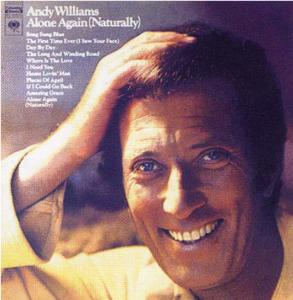
Alone Again (Naturally) is the thirtieth studio album by American pop singer Andy Williams, released in September 1972 by Columbia Records and mainly consisting of songs originated by other artists. For its release in the UK, the album was titled The First Time Ever (I Saw Your Face), and three of the songs were replaced with the 7-inch single tracks "Who Was It?" and "Marmalade, Molasses & Honey" and a recording that was not released on vinyl in the U.S., "If You're Gonna Break Another Heart".

"Wigwam" is a song by Bob Dylan that was released on his 1970 album Self Portrait. It was a hit single that reached the Top 10 in several countries worldwide. The song's basic track, including "la-la" vocals, was recorded in early March 1970 in New York City. Later that month, producer Bob Johnston had brass instrument overdubs added to the track; these were recorded in Nashville, Tennessee at a session without Dylan present.

You've Got a Friend is an album by American pop singer Johnny Mathis that was released on August 11, 1971, by Columbia Records. The phrase "Today's Great Hits" can be found above the title on both sides of the record jacket as well as both sides of the LP label as if to emphasize that this is essentially an album covering songs that were recently on the charts. This was a common practice of many vocalists of the period, so much so in fact that fellow Columbia artist Andy Williams also released an album titled You've Got a Friend in August 1971 on which he coincidentally covers seven of the 11 tracks that Mathis recorded for this album.
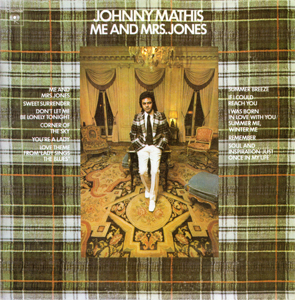
Me and Mrs. Jones is an album by American pop singer Johnny Mathis that was released in January 1973 by Columbia Records. While it does cover several big chart hits of the day like his last album, Song Sung Blue, did, it also includes songs that didn't make the US Top 40 or had never charted.
















